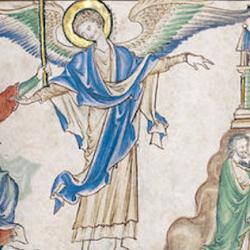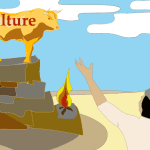The worship of the beast in Revelation 13 takes the form of an acclamation of His uniqueness. “Who is like the beast?” they cry. This has several layers of significance.
This acclamation echoes the acclamation of Israel in the song of Moses: “Who is like You among the gods, O Yahweh” (Exodus 15:11; cf. Psalm 35:10; 71:19; 89:8; 113:5). Moses turns the compliment to Israel: “Who is like you, a people saved by Yahweh” (Deuteronomy 33:29). Yahweh asks the same question, Who is like Me? (Isaiah 44:7; Jeremiah 49:19). Ezekiel asks the question of another power, Tyre, but the question has an ironic relation to Revelation 13, because “Who is like Tyre?” means “Who is as devastated as Tyre?”
At bottom, the acclamation of the beast places the beast in the position of Yahweh; the people of the land have indeed chosen their king, and he is Caesar.
In Hebrew, the phrase “Who is like the beast” would be “mi-cha-chayyah.” The orthodox equivalent, “Who is like God?” would be “mi-cha-el?” Revelation has already showed a “mi-cha-el,” the hero of the heavenly war in chapter 12.
And the acclamation of the beast ironically invokes precisely that war. The worshipers of the beast ask “Who is able to wage war (dunatai polemesai) with him?” That question has been pre-answered, because Michael “waged war” (polemesai) with the dragon and threw him from heaven (12:7, 9). Once again, we see that the beast is taking the place of the Lamb and/or the Lamb’s chief angel, Michael.














